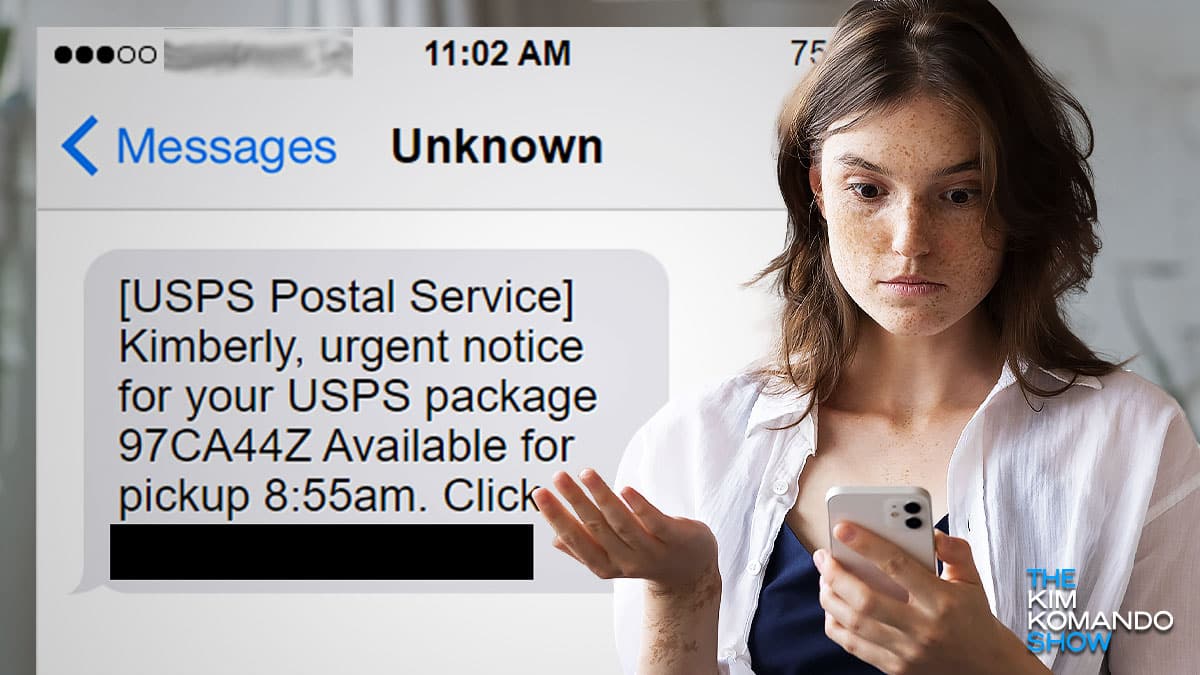People are buying high-ticket items on eBay, filing returns, then sending back thank-you cards instead of the product. Sellers are reporting the scam (with proof the return label is on a tiny envelope) but get stuck in an endless appeals process. Good luck getting eBay on the phone to help. I’d steer clear for now.
Area codes and numbers that are probably spam

Whew, the election’s over. The onslaught of robocalls and texts is over, too … right? Nope.
There are fewer political calls and messages, sure, but there are always scammers and spammers. It may be easier for these creeps to get a hold of us now that our phones aren’t constantly lighting up with election-related notifications.
Today, I’m sharing how to spot scammers faster and the privacy tool I used to cut my spam calls to zero. That’s right — I get none at all.
If you see these, don’t answer
It’s surprisingly easy to spoof phone numbers. A scammer can make it look like they’re calling from your bank or doctor’s office so you’re more likely to hand over your info.
Here’s what they definitely don’t want me to tell you: They spoof numbers from some area codes more than others. If you get a call from one of these area codes and you don’t recognize the number, let it go to voicemail:
- 216: Cleveland, Ohio
- 469: Dallas, Texas
- 657: La Palma, California
- 332, 347, 646: New York City
- 218: Northern Minnesota
- 712: Western Iowa
‘Any specific numbers I should watch for?’
Glad you asked. Certain spam numbers can get past your carrier. Give these a read so you’re better at spotting cybercriminals’ tricks:
- (865) 630-4266: This one’s tied to a Wells Fargo scam telling you your account has been locked.
- (469) 709-7630: Callers from this number will use your name and say you have a package awaiting delivery.
- (805) 637-7243: Hooray! You won a prize from Publishers Clearing House … not.
- (858) 605-9622: Someone’s trying to tell you your bank accounts have been hacked. (They haven’t.)
- (312) 339-1227: This one has a ton of scams associated with it, from weight loss supplements to failed package delivery attempts.
- (917) 540-7996: It’s an automated robocaller advertising any number of products.
- (347) 437-1689: Tax and sweepstakes scams are common for this number.
- (301) 307-4601: This one pretends to be your local post office.
- (878) 877-1402: More “frozen debit card” claims.
- (202) 221-7923: “Kelsey” calls with info about student loan forgiveness initiatives.
So, what can you do about this?
- The obvious one: Put yourself on the Do Not Call Registry. It’s worth doing, but just keep in mind it’ll only make a dent in the number of calls you receive … or have no impact at all.
- Block numbers: On an iPhone, you can block a caller by hitting the Info button (lowercase i icon) next to the call, then tapping Block this Caller. On Android, select the call in your Phone app, tap the three dots > Block/report spam. Blocking a number, though, doesn’t do much; spammers will just fire up a new one.
- Report it to the feds: Go to ftc.gov. Select Report to the FTC > Report Now > Report an annoying call. Maybe they’ll check it out … or maybe not.
Clever election scams targeting you

Fake political calls, texts and videos are nothing new. They’ve been flooding Americans’ phones for months. Some have a simple goal: Steal your money. (I’ll pass along a few tips for spotting those below.) Others are looking for detailed personal info, like a text scam warning there’s a problem with your ballot.
Sellers, beware of this new eBay scam
iPhone digital wallet attack
Cybercriminals are zeroing in on iPhone users with fake Apple emails, tricking them into handing over credit card info. Here’s how to spot the scam and stay protected.
Best way to stop spam texts for good

“Official notice from USPS. Your delivery is on hold.” I wonder why …
“Hi, how are you?” Who could this be?
3 security steps every small business needs to take right now

Business accounts can be hacked as easily as personal accounts. Imagine all your hard work being held at ransom by a hacker or your data falling into the hands of someone who can sell it to the competition.
You need to secure your business as best you can, and here are three crucial tips to get started. This tip is brought to you by our sponsor, NetSuite.
FB missing persons scams
Most of us know this scam is going around, but a lot of people are still sharing them. Make sure you teach your friends and family to avoid sharing these type of posts to protect themselves.
The fight that broke Netflix
Mike Tyson vs. Jake Paul pulled in 60 million viewers. Paul claimed the win, but the real champ was Netflix. Also coming up: a robot dog patrolling Mar-a-Lago, a QR code email scam warning, and Kim’s chat with NordPass VP Gerald Kasulis about the shocking passwords people still use and how a password manager can save the day.
Stop annoying political texts

I’ve heard from the presidential candidates, their families and every politician within a 100-mile radius. The texts don’t stop in October of an election year, especially when it comes to a presidential election.
5 things you should never put on a resume
In life, few rewards come without risk. Take your dream job, for instance. If you want to land that position you’ve been dreaming about, you’ll need to make a great first impression.
When you’re applying for jobs, that all comes down to your resume. Every little detail makes a big difference. For example, a small mistake could take you out of the running for a job you’re qualified for.
Massive data leak impacts 1 in 3 Americans

Data broker MC2 Data left more than 100 million records of Americans exposed online for anyone to copy, grab, forward, sell on the Dark Web — you name it. This comes only a month after the National Public Data breach of 2.9 billion records. I’m getting so tired of these data broker companies and people-search sites screwing up, and it’s you and me who have to pay for their mistakes.
New malware looks like a Google login page
Ever get stuck on a webpage that won’t close? A new scam makes it even harder to escape.
Sextortion scams are getting more realistic
Got an email saying your webcam was hacked? Don’t worry — it’s just another sextortion scam. I’ll tell you why it’s all fake and how to stay safe.
How I avoided a $40K scam
Paul emailed me about a $39,500 invoice, demanding I pay up ASAP. The problem? I didn’t owe him a cent. Plus, AI is eyeing 60 million jobs, Gen Z is trauma dumping on TikTok, and a woman was rescued after falling 60 feet off a mountain thanks to her navigation app.
Need some extra cash? 15 jobs you can do from home

Working remotely isn’t suitable for everybody. But in the wake of the pandemic, it has seen a considerable boon globally. Tap or click here for legit ways to find work-from-home jobs.
If you’re interested in earning a living from home, there is no better time to get involved with the right opportunity.
Are scammers using infidelity to manipulate you?
“Your spouse is cheating on you.” That’s the shocking line behind a new sextortion scam. The message includes a link claiming to offer “proof,” but it’s a trap to get you to click. Plus, Gen Z is moving away from Google, and strange science wins big at the Ig Nobel awards.
Big Tech listens to your convos
At least one media group gathers info from conversations and uses it for targeted ads. Plus, a new sextortion scam tactic, Amazon’s “Just Walk Out” tech hits more NFL stadiums, and police are towing Teslas from crime scenes.
The smishing scam
Received a message from FedEx or UPS about a package you didn’t order? Don’t fall for it —clicking that link could put your personal and financial information at risk.
Elder fraud is on the rise – These are the most common scams

Here’s a stat that blows me away: One in every 10 seniors is a victim of identity theft each year. Americans over the age of 60 lost $3.4 billion in fraud schemes in 2023. That’s almost an 11% increase from the year before, and things are only getting worse.
Storing cash in Venmo or Cash App? Your wallet's in danger
Unlike the money in your bank, you can lose your funds sitting in these apps. Plus, a hacker found thousands of big biz secrets, a new Amazon scam is spreading, and ChatGPT teases a search engine.
